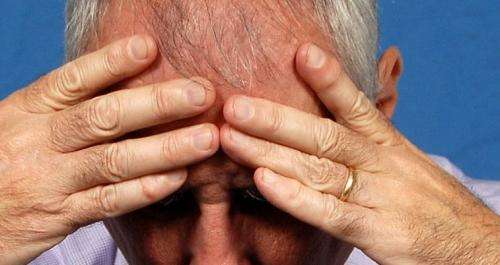Chronic migraine headache relief possible with outpatient surgery

When medications fail to eradicate debilitating migraine headaches, surgery could provide relief for certain patients.
David Megee, MD, a UC Health plastic and reconstructive surgeon, now offers nerve decompression surgery for long-term relief from chronic migraine headaches. The procedure—which involves using techniques to relieve pressure on a pinched nerve—is done in an outpatient under general anesthesia at the University of Cincinnati Medical Center (formerly University Hospital).
According to the National Institute of Neurologic Disorders and Stroke, 10 percent of people worldwide suffer from migraine headaches. The condition is believed to stem from irritation to a large peripheral nerve branch (trigeminal nerve) in the face and neck. The exact cause of this irritation is unknown.
Although scientific literature on the cause of migraine headaches is inconclusive, potential causes of migraine headaches include hormonal fluctuation, genetic predisposition, stress and anxiety, bright/flashing lights and lack of food or sleep.
Determining Procedure Eligibility
"Surgery isn't the right option for all migraine sufferers, but it can be a very effective method of long-term relief for people who fail preventative medications and require the use of 'rescue' medications on a routine basis," explains Megee who is also an instructor of clinical surgery at the UC College of Medicine Department of Surgery. "Rescue medications are costly and have side effects. If we can decrease or end the use of preventative medications, patients don't have to worry about having them handy all the time, which is important for quality of life."
Chronic migraine headaches can cause severe pain, nausea and/or vomiting and a sensitivity to light and sound that affects a person's ability to function normally. Depending on the severity of a person's migraine attacks, some people choose to take medicine to prevent attacks—others treat the symptoms as they occur.
Eligibility for nerve decompression surgery is based on the patient's medical history, a headache journal and response to Botox injections to paralyze the muscles that irritate the nerve linked to migraines.
"Botox helps us determine if the patient has an identifiable 'pinched nerve.' If this is the case, we can use techniques to relieve pressure on that nerve and reduce symptoms for most patients," says Megee.
Published clinical data has shown that 85 percent of patients who undergo nerve decompression surgery for migraine headaches have a 50 percent reduction in migraine episodes, adds Megee.
"Some migraine sufferers have peripheral nerves that serve as triggers to initiate their headaches. In these patients, a nerve decompression procedure may be an effective treatment to prevent the headaches from being set off," explains Megee, noting that two nerves in the forehead tend to be the most common target areas.
"These are addressed using an endoscopic technique—very similar to a brow lift—where the corrugator muscles are removed to take pressure off the nerves. The zygomaticotemporal nerve is accessed via a similar endoscopic (minimally invasive) approach and is sealed off where it emerges through the temporalis muscle. The greater and lesser occipital nerves are addressed behind the head via an incision just above the posterior hairline," he explains.
Each of these techniques can be done in about an hour on an outpatient basis.













